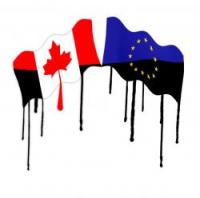This is an archive of news stories and research from the National Union of Public and General Employees. Please see our new site - https://nupge.ca - for the most current information.
Canada pressures EU to take a u-turn on Europe's clean fuel law.
 Brussels, Belgium (9 February 2011) - A scientific report for the European Commission, published on-line early this month and then immediately withdrawn, has confirmed that carbon emissions from Canadian tar sands oil production are "significantly higher than... industry-average emissions from conventional fuels."
Brussels, Belgium (9 February 2011) - A scientific report for the European Commission, published on-line early this month and then immediately withdrawn, has confirmed that carbon emissions from Canadian tar sands oil production are "significantly higher than... industry-average emissions from conventional fuels."
In 2008, the European Union (EU) agreed to a law setting a 10% greenhouse gas (GHG) emission reduction target for the extraction and production of transport fuels. The law is designed to encourage the oil industry to use more environmentally friendly fuel sources.
The Conservative government has been putting huge pressure on the European Commission to treat tar sands oil the same as conventional oil, despite its higher emissions. The Canadian Prime Minister Stephen Harper discussed the issue with European Commission President José Manuel Barroso in 2010, just one of countless high level lobbying meetings involving Canadian officials, oil industry figures and European policymakers.
"This report blows the lid off of the Canadian and Albertan government's campaign of misinformation in promoting dirty tar sands fuel in the EU. The report clearly lays the ground for strong clean fuel policies in Europe, which ensure that the tar sands are held accountable for their substantially higher greenhouse gas emissions," says Graham Saul, Executive Director, of Climate Action Network-Canada.
Canada wants the EU to apply the same carbon emissions ‘default value’ to tar sands that the EU applies to conventional oil production, despite the significantly higher emissions resulting from extraction and processing of tar sands oil.
The study released shows tar sands ‘well-to-wheel’ emissions are 23% greater than those for typical conventional oil sources.
“Tar sands oil extraction and production is one of the dirtiest methods of fuel production known to man. If the EU is serious about cutting transport emissions it makes sense to treat dirty sources of oil differently. The EU’s clean fuel rules, agreed over two years ago, won’t be worth the paper they’re written on as long as tar sands are portrayed as no different to conventional oil sources,” says Nusa Urbancic, Policy Officer at Transport & Environment.
"The Government's of Canada and Alberta have been engaging in false advertising of the tar sands, and Europe is not buying it. We look forward to seeing European Parliament integrate this important research into their progressive clean fuel policy, the fuel quality directive,"says Saul.
NUPGE
The National Union of Public and General Employees (NUPGE) is one of Canada's largest labour organizations with over 340,000 members. Our mission is to improve the lives of working families and to build a stronger Canada by ensuring our common wealth is used for the common good. NUPGE
More Information:
